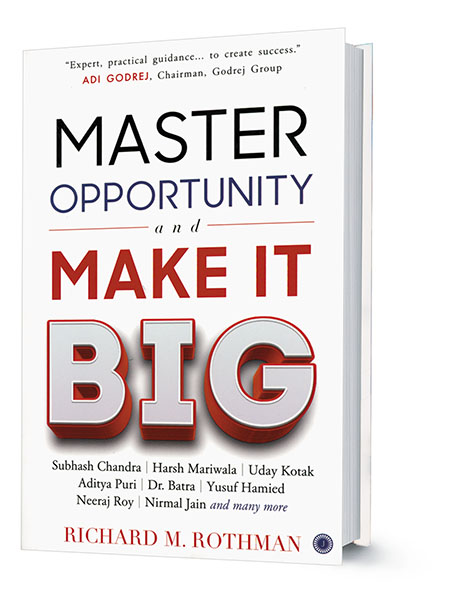
Book review: Master Opportunity and Make it Big
Lessons from marquee businessmen

Readers will benefit from the life lessons enumerated through the mini-bios of these businesspeople, on how each worked passionately to create value for India, persevered against odds, maintained flexibility in business models and always looked to create scale, among other salient lessons.
Yet, some of the advice that has been tagged as opportunity accelerators—or character traits to be practiced—could be tempered. For example, Rothman calls the first one self-awareness or vision, where he says it is useful to know what direction to take, and for which you must focus on your own goals, not what your parents would like you to do.
However, often it is parents who help young people understand their talents and sometimes provide seed money. Of the 18 people whose success stories are traced in the book, eight came from family businesses. In Uday Kotak’s case, it was his father who suggested he pursue a business of his own interest and gave him an office in Mumbai’s Flora Fountain.
In Nirmal Jain’s family, they took pride in each member starting his own business, and he says when you look back from a 20-year perspective, vision is 80 percent hindsight and 20 percent foresight.
Jain adds that in 1995 he didn’t really have a clear vision of where he would be today, and that is true because if there’s one thing Rothman’s sketches or longer biographies—like those done by Gita Piramal in Business Maharajas, or Business Legends—illustrate, it is that the business decisions taken and opportunities seized are an amalgam of these leaders’ background, business partners, customers and life’s experiences.
So, Dr Hamied of Cipla persevered for more than 10 years to give the world an AIDS drug at the price of a dollar a day; today 15 million people in Africa alone are being treated with Cipla’s drugs. Hamied drives his own car, and his business decisions were possibly shaped by the fact that his father was a freedom fighter.
Amit Jatia who believes business economics is more important than market expansion must have learned a lot from McDonald’s quality standards and processes when he set up successful franchises in western and southern India since, as a 28-year-old vegetarian at that point, he was not even in the foods business; he began by working in his family business of lubricants. The bio of Vithal Kamat—founder of the Kamat Group of Hotels—talks of how his mentor taught him that only a powerful seed can grow a wonderful crop, and so he attaches a sachet of seeds with each of his visiting cards.
This book, in a sense, is just that: Readers get the essence of India’s top business leaders, but if they want that seed to grow, they need to invest in reading more detailed books, though not necessarily on the same people.
Namita Jain is a strategy consultant
Master Opportunity and Make it Big
Author: Richard M Rothman
Publisher: Jaico Publishing House
Price: ₹350
Pages: 249
(This story appears in the 11 May, 2018 issue of Forbes India. To visit our Archives, click here.)
Post Your Comment














